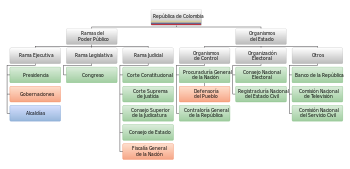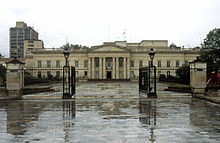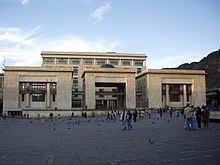Colombian Government
Colombia is a presidential country, and a unitary state with separation of executive, legislative and judicial powers. The current political Constitution was proclaimed on July 4, 1991. The 61st President of the Republic and the Departmental Governors are the ones in charge of enforcing the nation's regulations.
Branches of Public Power
The political constitution defines the structure of the Colombian state through the division of public power into three branches: the executive, the legislative and the judicial. However, given that there are state functions that these entities do not fulfill, the bodies are appointed to carry them out, such as: the Public Ministry, the Comptroller General, the National Electoral Council, the National Registry, the Bank of the Republic, the Communications Regulation Commission and the National Civil Service Commission, among others.
Executive Branch
He is in charge of managing the nation's resources. The President of the nation and Head of Government is the head of the executive power, which he shares with a ministerial Cabinet. He is also the commander-in-chief of the Military Forces. The cabinet is made up, in addition to the President and the Vice President, of office ministers and directors of administrative departments. The executive branch has three levels: president (a) (national order), governors (a) (departmental order) and mayors (a) (municipal order)
The president is elected by direct popular vote for a period of four years or less, in case of substitution. The 1991 Constitution prohibited lifetime presidential re-election and mediate re-election was previously possible (a former president could be re-elected but the incumbent president could not be re-elected for the following term). With a constitutional referendum in 2005, this prohibition was abolished and immediate re-election was legalized for only one time. Two presidents made use of it, being able to participate in the elections from office. Currently, with legislative act 02 of 2015, presidential re-election is prohibited.
- Senior Management Councils
- Ministries
- Administrative Departments
- Superintendences without legal status
- Special administrative units without legal status
There are also Governors and Mayors who are elected by popular vote and who within their functions are the highest administrative authorities at their respective levels with functional independence from the presidency. This means that they are not subordinated to the presidency in matters of territorial ordering, but they are in other matters such as matters of public order.
Legislative branch
It is in charge of elaborating the norms and laws. Exercising control over the Government and reforming the Constitution.
A bicameral Congress made up of the Senate (100 members elected by national circumscription for a period of four years and an additional number of 2 senators elected in a special circumscription by indigenous communities) and the House of Representatives, made up of one hundred and sixty-six members elected for 4 years, of which one hundred and sixty-one represent the territorial constituencies (departments and the Capital District).
Judicial branch
It is responsible for applying the law fairly and resolves conflicts between people in accordance with the law. It is responsible for administering justice, resolving conflicts and controversies between citizens and between them and the State, and deciding controversial legal issues through pronouncements that acquire the force of definitive truth. Said pronouncements mainly take the form of judgments, rulings, or orders. It is in charge of making effective the rights, obligations, guarantees and freedoms enshrined in the Constitution and in the laws, in order to achieve and maintain social coexistence.
The judicial branch of Colombia begins with the Political Constitution of 1991. It is made up of the Supreme Court of Justice, the Constitutional Court, the Council of State, the Superior Council of the Judiciary, as well as the courts and tribunals. The Office of the Attorney General of the Nation is an independent body attached to the judicial branch of the Public Power in Colombia.
Electoral Organization
It is the set of entities in charge of organizing the elections, their management and surveillance, as well as everything related to the identification of people.
- National Electoral Council
- National Civil State Registry
Autonomous and independent bodies
They are State entities, with autonomy from the three branches of power, according to the Constitution or the laws due to their functional specialty.
- Bank of the Republic
- National Civil Service Commission
- Regional Autonomous Corporations
- Entes Universitarios Autónomos
- Communications Regulation Commission
Control Bodies
They are those organizations to which the Political Constitution entrusts the functions related to disciplinary control, defending the people and fiscal control. They are not attached to or linked to the branches of public power.
- General Audit of the Republic
- Comptroller General of the Republic
- Office of the Ombudsman
- Procuraduría General de la Nación
Other data
Departmental governments
The departments have their own governors and public corporations elected by suffrage every four years. They are subdivided into municipalities and some districts with a mayor and a municipal council, also elected every four years by direct vote.
Political Parties
According to the National Electoral Council of Colombia, the political organizations that currently have legal status in Colombia are:
- Colombian Liberal Party
- Colombian Conservative Party
- Democratic Center Party
- Radical Change Party
- Social Party of National Unity "U Party"
- Green Alliance Party
- Colombia Humana
- Alternative Democratic Party
- UP Patriotic Union
- Independent Social Alliance Party
- MIRA political party
- ADA Party
- Colombia Justa Libres Party
- Dignity Party
- Colombia Renaissance Party
- Oxygen Green Party
- Colombian Communist Party
- Common Party
- League of Governors Anticorruption
- New Liberalism
- National Salvation Movement
- Movement Indigenous Authorities of Colombia AICO
- Movimiento Alternativo Indígena y Social MAIS
- Colombian Democratic Party
- Colombian Ecologist Party
- Citizen Force Party
- Party in March
Contenido relacionado
Carlos Eugenio Restrepo
Leon Febres-Cordero Ribadeneyra
Manuel Amador Guerrero



